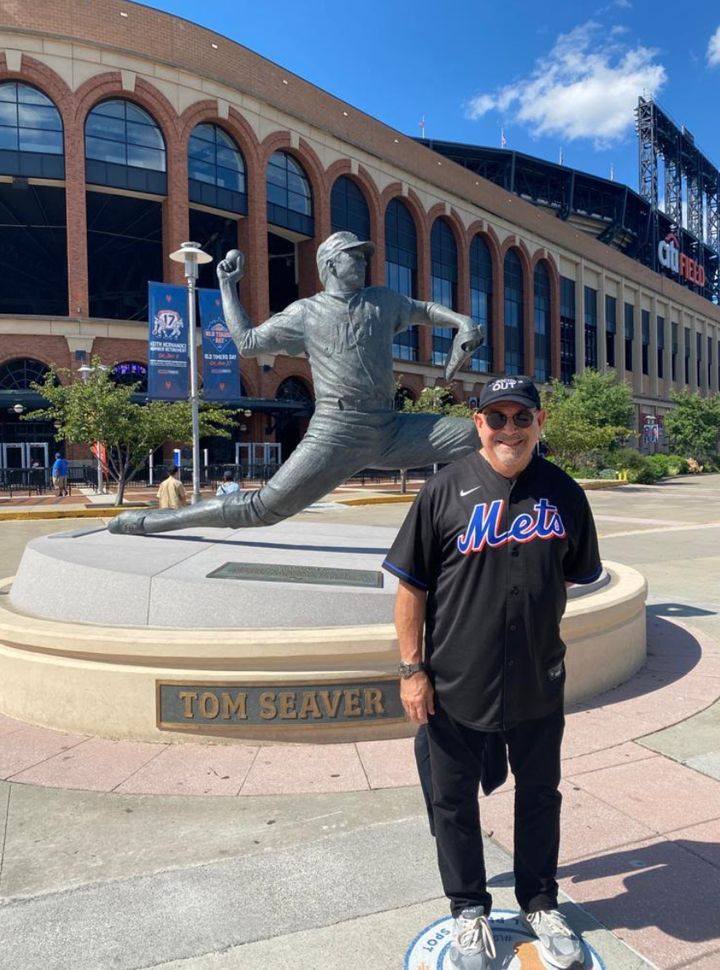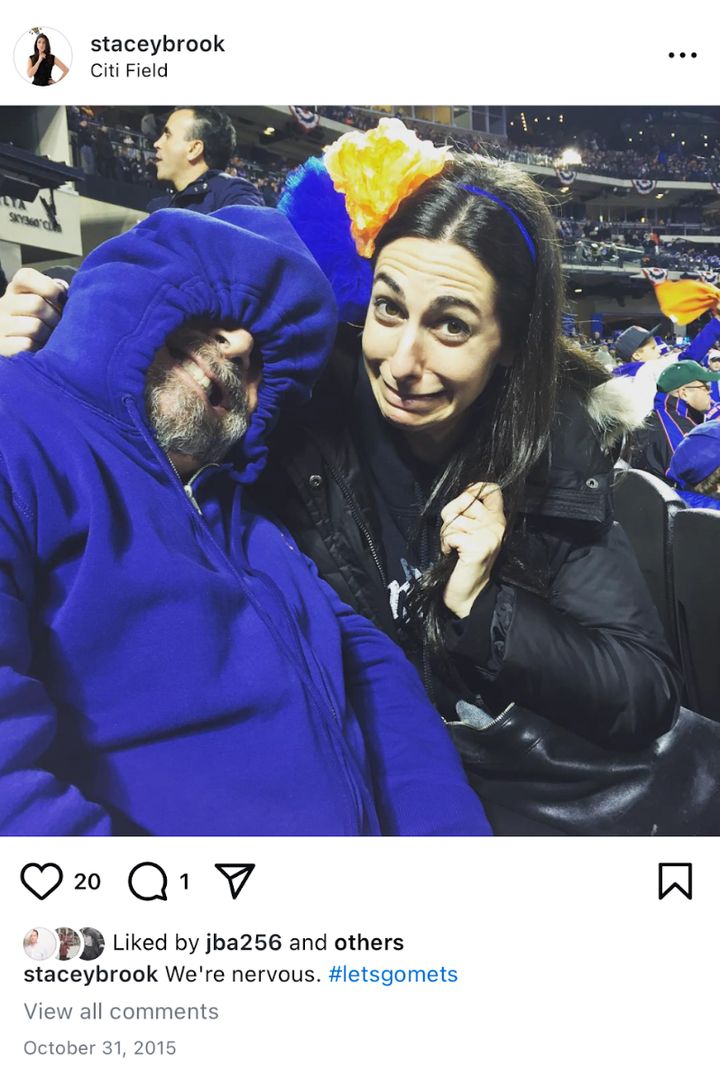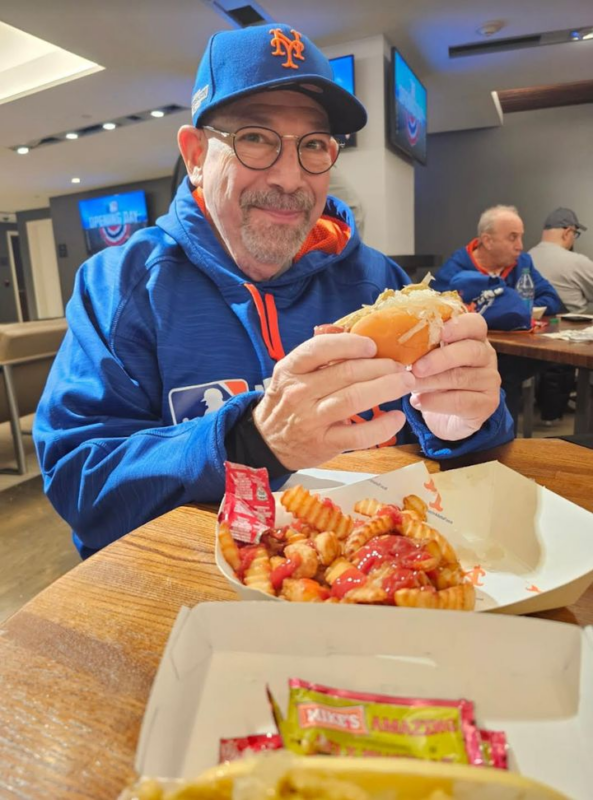News
My Dad Always Said The Mets Will Break Your Heart. I Never Thought It Would Happen Like This.
My father was regularly one of the first diehard fans to leave a Mets game. During the seventh inning stretch he would rise from his season ticket-holder seats, sing a spirited version of “Take Me Out to the Ballgame,” and head straight to the parking lot to beat traffic. He would leave even earlier if the Mets had dug themselves into an early, deep hole. He loved his team enough not to want to watch them suffer.
The thing about rooting for a team that has the best opening day winning percentage record in the history of baseball, is that they start each season with hope. My father loved the possibilities a new season held and was present for many a highlight. He saw Johan Santana pitch a no-hitter and was probably eating a hot dog during Robin Ventura’s famous grand slam single in the 1999 NLCS Game 5. He also fought not to cover his eyes during countless blooper errors, players left stranded on base and strings of utter collapse.
My father was 8 when the Mets franchise set up shop in Queens, and he remained a devotee for life. Still, he would often say, “I love them, but they’ll break your heart.”
The last time Dad and I were together in Shea Stadium before the opening of Citi Field, I asked him if he was devastated to leave the stadium of his childhood behind.
Without hesitation he said, “I’m really good at moving on.”
You have to be good at moving on to be a Mets fan.
When my father was diagnosed with pancreatic cancer in February 2023, the Mets were about to spend $350 million staffing up with monster pitchers to chase owner Steve Cohen’s dream of a money-won victory. A little over a year later, an intensive surgery had removed my father’s tumor, chemo had blasted what it could of a disease more virulent than steroids in late ’90s baseball, and three months of clean scans had alleviated my family’s persistent worries.
Soon after his treatment ended, my father danced at my brother Adam’s wedding, flourishing a fold-up cane like a magic wand, allowing it to unfurl to the beat of the music with a flick of his wrist. It was a new season. He was giddy with hope.
A few months later, my father was abruptly rediagnosed. The cancer had spread to his liver and lungs as the Mets began their 2024 season. Initially the team was — as fans will surely remember — atrocious. So bad, in fact, that the games I was counting on to lift my father’s spirits would be turned off within minutes.
Watching him in perpetual pain with very few worthy distractions, I joked that the Mets were killing my father, secretly worrying it might be true. Sure, as a Mets fan, part of you always braced for disappointment, but outright slaughter? Without even the slim promise of success the Mets kept tucked under their orange and blue hats, what would keep my father in the game?
And then came Grimace, the purple monster of my childhood McDonald’s birthday party memories, with his shake and his T. rex-length arms, and his random pitch that turned fate around for a bunch of superstitious players and fans desperate to put their heart and hopes into something. Like most Metropolitans superfans, my father was ignited. A man who asked for nothing, when I surprised him with a “Grimace Era” T-shirt a few weeks into the phenomenon, he immediately requested more. By the middle of the season, his wardrobe consisted entirely of Grimace and “OMG” gear, and his entrance into any room was an unexpected parade of blue, orange, black and purple.
Dad added a Grimace hat to his chemo uniform, which always featured one of his button-down Mets jerseys that he wore both for luck and easy access to his port. He was the unofficial leader of the Mets fan club at his outpost of Memorial Sloan Kettering, and it was way more fun to push his wheelchair into the waiting room when the dejected headshakes he exchanged with fellow fans were replaced with high fives.
One of the most devastating aspects of my father’s disease was irreversible nerve damage called neuropathy, a side effect from the chemotherapy, which stole his ability to walk. He began treatment walking with a left-leg drop and entered the Grimace Era relying on a walker for mobility. My brother took him to his last game at the seats Dad kept warm for almost 40 years, helping my father hobble his way down a string of steps built for people who, like me, often take their ambulation for granted. The usher, who knew my father by name and had even been treated at my father’s podiatry practice, pulled my brother aside as he hunted for a place to stash dad’s walker. “I hate to see your father like this,” he said. “There are seats for people with disabilities that will be more comfortable for him. You should ask about them.”
Hearing this from Adam was one of the first times I felt like we were rooting for someone who was destined to lose.
My father went to see a game in those accessible seats just once with a friend. They left in the fourth inning, because my father didn’t feel well, or because the Mets were losing early — probably both.
As Dad’s chemo treatments failed to keep the cancer at bay and his neuropathy progressed, it became increasingly hard for him to leave the house. But as his 70th birthday approached, we knew we had to do something to celebrate. We reserved a suite in Citi Field for early August to spend the occasion with friends and family. I bought us a dozen Grimace and “OMG”-themed T-shirts and stuffed my Amazon cart with purple party decorations. My father requested that instead of Mr. Met, a regular visitor to Citi Field suites on special occasions, Grimace show up to bless the festivities.
“I’m not sure how I swing that, Dad,” I said. “Do I call McDonald’s?”
The next day I bought a Grimace costume online for $70 and conspired to have my brother burst into the room wearing it just before my father blew out his birthday candles.

A week before the party, my father was advised by his doctor to abandon his treatment entirely. The side effects were not worth it, they said. The cancer was too persistent. The day of the birthday game, torrential rains seemed like they would wash Grimace away on Noah’s ark, making the prospect of navigating the parking lot, and then Citi Field, with a walker challenging. My father had also developed a torturous buffet of new symptoms related to the cancer itself that were peaking with the storm.
“Don’t worry about it, Pops, we’ll reschedule,” I told him. “There will always be another game.”
I knew that wasn’t the case when he stopped paying attention to the Mets altogether. It was the last thing he let go, a few days before he died. He had been fighting for a year and eight months, and when his treatment options ran out, so did his spirit. His family did not want to watch him suffer, and he understood what that was like as much as anyone. My father knew when to leave the game.
Dad passed at home, surrounded by his family. The sun was shining, and his window was open to let in the fragrance of the flowers in the front yard. The Mets were in Wild Card contention. It would have been the perfect day for a baseball game.
The day after my father died, our immediate family went to view him at the funeral home. He was wearing a black dress shirt covered in a martini glass print to honor James Bond, another of his great loves. While weighing our all-black wardrobe options, my mom, sister, brother and I decided it felt more appropriate to each borrow a cherished Met jersey from Dad’s collection. We stood around him for the last time, a team heartbroken.
One of the hardest things I had to do after my dad died was opt out of his season’s tickets. I was sent a link and asked to simply click on a button agreeing to let go of the seats my father had maintained since just after I was born. Usually a rip-off-the-Band-Aid kind of gal, it took me until the day before the opt-out deadline to complete the task — the anguish of innumerable dropped balls and games almost won at my fingertips. While we let the future season’s tickets go, my siblings, mom and I decided to opt into the playoffs package for this year in case Grimace continued to power the Mets to a strange victory.
The Mets did, indeed, make the playoffs, and the remaining members of the Brook family went to both postseason games against the Phillies at Citi Field. It wasn’t a choice, it was a calling. At the stadium, my heart ached with every fan who passed by that was my father’s age (which included half the attendees), and every story I heard someone tell about being at Shea for the ’69 World Series (my father was also there). On the way to procure Fuku spicy chicken sandwiches, I walked a few steps behind my brother and mother, the former wearing my father’s Dream Week jersey, the latter sporting Dad’s ’80s satin Mets jacket. They were holding hands, I imagine for strength.
Mom and Adam sat together in Dad’s seats behind home plate, while the rest of us cheered for the Mets’ gimmick-propelled success from the bleachers. In the second home game against the Phillies, the Mets’ shortstop phenom, Francisco Lindor, smashed a game-winning, series-clinching grand slam. With the crack of his bat, the stadium exploded in one giant roar — a sound that practically lit up the sky.

I was high on victory. I was jumping up and down, high-fiving strangers with abandon, accessing the most guttural celebratory shouts. I was definitely sobbing. I was full-body heaving. I was in physical pain. I wanted my dad. How could he be missing this? How was it fair that he wasn’t there? Overwhelmed by the cruelty of losing him just a month before what would likely have been one of the most memorable moments of his life, I pined for his presence. All I felt was his absence.
My partner, who was next to me, pulled me towards him for a hug and said what we always say to each other now when we think of Dad. “You know who would have loved this?” he asked, needing no answer. “But if you don’t stop crying, people are going to think you’re a Phillies fan.”
Right now, it hurts to do the things my father loved. I want to cry every time I open my plant identification app to try and remember the name of a forgotten flower we both loved, or when I eat his favorite piece of ikura nigiri with a quail egg on top, or when I sing ”OMG” to myself — as we used to do to each other — when I flip on SNY to watch a Mets game.
Support Free Journalism
Already contributed? Log in to hide these messages.
When I enjoy these things, I know I honor my father and the magic he conjured in my life. I want to be able to simply say, “You know who would love this?” and not think about a life cut too short. I want to remember him and just be grateful to have had a father who inspired my sense of adventure, dispensed the best advice, and was so silly and joyful that a baseball season defined by a big purple mascot, an unexpected pop song, and a lucky pumpkin suited him perfectly.
And I know I will. But right now, I don’t want to look at flowers. And I’m not sure whether I want the Mets to win or lose. It’s hard to know what will hurt more, to give into the tradition of disappointment, or behold a rare Miracle without my father present.
Rooting for the Mets teaches you how to live with heartbreak. And it’s a good thing, because whether or not they make the World Series, whether they drop the proverbial ball or ultimately go on to victory mere weeks after my very favorite of their fans has passed, my father will be rooting for them wherever he is, and it will break my heart.
Stacey Brook is a writer living and eating too much pasta in New York City. Her work can be found in the New Yorker, McSweeney’s, Oprah, Teen Vogue, and more. Let’s Go Mets!
Do you have a compelling personal story you’d like to see published on HuffPost? Find out what we’re looking for here and send us a pitch at pitch@huffpost.com.
Read more

